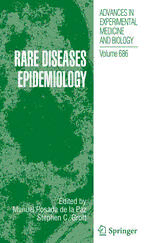
Rare Diseases Epidemiology PDF
565 Pages·2010·10.827 MB·English
Most books are stored in the elastic cloud where traffic is expensive. For this reason, we have a limit on daily download.
Preview Rare Diseases Epidemiology
Description:
'Rare Diseases Epidemiology' offers numerous approaches to increase the knowledge base of rare diseases and conditions and to facilitate the development and dissemination of interventions for the prevention, diagnosis, or treatment of over 6500 diseases and conditions. The goals of epidemiology are not restricted merely to providing numerical data on the prevalence or incidence of diseases in a limited or general population. Analyses of epidemiological data gathered from appropriately designed and conducted studies are required to establish public health policies and priorities in all nations. Information gained from these studies lead to a better understanding of the etiology and the impact of genetic or environmental factors on the occurrence and outcome of these disorders. The term Rare Diseases includes both acquired and inherited disorders. 'Rare Diseases Epidemiology' provides methods and approaches from the collective experiences of established research investigators who address these significant issues of the development of patient registries; the collection, storage and selected distribution of bio-specimens from bio-banking activities; the validation and utilization of genetic testing and newborn screening procedures; the presentation of issues related to the importance of case reports to increase knowledge of rare diseases; the challenges and models for population-based surveillance studies for rare congenital and inherited disorders; the statistical methods for the geographical analyses of rare diseases; the value and need for clinical trials and comparative effective studies; and meeting the requirements of regulatory agencies. Economic, societal, and ethical concerns are presented as patients and families encounter difficulties obtaining the correct diagnosis, gaining access to treatments, and receiving coverage or reimbursement for approved interventions, and for developing a public understanding of the costs to patients and their families and the burden of illness affecting the quality of life of millions of patients with rare diseases and conditions. Framework programs for rare diseases research as developed by the European Union and the value of national plans for individual member countries are discussed and represent the public commitment to patients with rare diseases. Likewise, similar programs have been implemented in the USA as a result of the Orphan Drug Act to address the needs of the rare diseases community.
See more
The list of books you might like
Most books are stored in the elastic cloud where traffic is expensive. For this reason, we have a limit on daily download.
